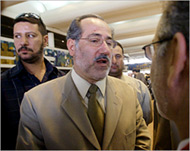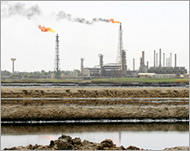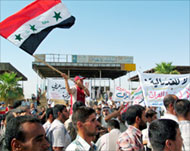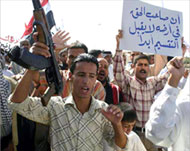Iraq talks stall over religion, oil
Talks on Iraq’s new constitution have stalled over the role of Islam and the distribution of the country’s oil wealth, negotiators say.

The leadership of the country’s Kurdish minority said it may drop its contentious demand for the right to secede.
The US is putting intense pressure on negotiators to finish the charter, which Washington hopes will take the steam out of the armed uprising.
Iraqis have until Monday night to complete work on the draft, otherwise parliament must dissolve.
Mullah Bakhtiyar, a senior official from the Patriotic Union of Kurdistan (PUK), the political party of Iraq’s President Jalal Talabani, said on Saturday that all parties were showing flexibility to finish drafting the constitution.
But Kurdish officials also complained that the Americans pressured them into dropping a demand for self-determination – which goes beyond federalism and would imply the right of the Kurdish-run autonomous region to declare its independence.
Demand given up
“As for the self-determination for the Kurds, this issue did not enjoy the support of Sunnis or Shias and we almost gave up this demand,” Bakhtiyar of the PUK said.
The Kurds have enjoyed de-facto independence since 1991.
If the Kurds drop their demand to guarantee the right of self-determination – a code word for eventual secession that goes beyond mere federalism – it would represent a major concession and would remove an obstacle to agreement on the charter by next Monday’s deadline.
 |
|
Al-Rubaie warned of a civil war if |
But a comprehensive compromise on a draft remained elusive, with the main dispute focusing on the role of Islam in the new state, pitting Kurds and secular groups against parties representing Iraq’s Shia majority.
“As for the issue of Islam’s role, negotiations are still under way,” Bakhtiyar, told The Associated Press from the Kurdish city of Sulaimaniyah.
On Saturday, leaders of all factions continued meetings in Baghdad’s fortified Green Zone.
Sunni Arabs complained they were being sidelined in talks on the new constitution and warned that their community will reject the document if it is submitted to parliament without Sunni consent.
“They will surprise us in the final hour,” Sunni representative on the drafting committee Saleh al-Mutlaq told The Associated Press. “We will reject it and the people will be angry, the street will be angry and as a result we will be back to square one.”
Deep differences
Al-Mutlaq said the talks had bogged down after “deep differences” emerged.
He said Shias were demanding that the new charter state that the decrees of their religious leadership were sacred, something both the Sunnis and Kurds oppose.
Shia lawmaker Saad Jawad Kandil said the division of Iraq’s potentially vast oil revenues also remained unresolved, along with the question of whether federal units could maintain relations with foreign states.
 |
|
Division of Iraq’s vast oil |
Shias insist that the foreign affairs should be the job of the central government while the Kurds prefer that each region have the right to maintain ties with other countries, Kandil said.
Iraqi National Security Adviser Muwafaq al-Rubaie has warned of a civil war in the event that the issue of federalism was not resolved.
Meanwhile, a representative of Iraq’s Muslim Scholars Association abroad, Mohammed Ayash al-Kubaisy, stressed the need for Sunni Arabs’ participation in the upcoming referendum on the Iraqi constitution.
He said this participation will have a direct impact on the decision-making in the country.
However, he said this participation should not be conditioned on what he called “giving up jihad or pursuit of mujahideen”.
Demonstrations
On Friday, Aljazeera reported that six armed Sunni groups urged Iraqis to register for participation in the referendum and to vote “no” in order to abort what the groups described as the American scheme in Iraq.
 |
|
Iraqis have protested calls for |
Sunni Arabs and some Shias rallied in Baghdad and elsewhere on Friday in protest against calls for a federated state.
On Saturday too, about 5000 people gathered outside the main mosque in the western city of Ramadi to condemn the constitutional process.
In the northern oil city of Kirkuk, several hundred Arabs demonstrated against the charter, chanting “Yes to unity, no to federalism”.
“We are against federalism (because) we believe that federalism is a step toward separation,” said Mohammed Khalil, an Arab city council member.
In the 1980s, former President Saddam Hussein displaced thousands of Kurds from Kirkuk and replaced them with Arab ‘settlers’.
The city, which the Kurds seek to incorporate into their territory, has been the scene of ethnic tensions the past two years.
Kurds’ rights
According to Article 58 in the interim constitution, all Iraqis, including Kurds, displaced under Saddam’s government have the right to return to their homes or receive compensation.
Political leaders appear to have agreed on implementing Article 58 before general elections are held on 15 December.
On Friday, a Kurdish official who took part in the negotiations said the US was pressing the Kurds to accept demands of Shias and Sunnis on the role of Islam in government in order to reach agreement.
The process hinges on the success of the drafting committee in producing a constitution acceptable to all Iraqi communities by Monday’s deadline. If parliament approves the draft, it goes to voters for ratification in October.
|
“We are against federalism (because) we believe that federalism is a step toward separation” Mohammed Khalil |
In recent weeks, Sunni groups – which boycotted January’s parliamentary elections – have been urging fellow Sunnis to vote in the referendum and a general election planned for December. The voter-registration deadline is 1 September.
The boycott left the once-dominant community with few seats in a parliament dominated by Shias and Kurds, and reduced its influence in the political manoeuvring surrounding the draft charter.
In other developments, in Baghdad two police officers were killed in a gunfight on Saturday morning with armed fighters near al-Shurta tunnel in the Amiryaa neighbourhood, Captain Talib Thamir said.
Unidentified assailants also shot and killed two civilians in the Al-Amil district, and a mortar shell exploded in the capital’s Mansur neighbourhood, injuring a woman, police said.
Mosul killings
Another US soldier was killed on Saturday in a roadside bombing. The US military said he was assigned to the 42nd Military Police Brigade but gave no further details.
Also on Saturday, Iraqi police and US troops clashed in Mosul with fighters, killing three of them and seizing a car used in the kidnapping-slaying of three members of the Iraqi Islamic Party the day before, according to police.
 |
|
Arabs and Turkmen at a rally in |
Police Brigadier-General Saeed Ahmed al-Jbouri said it was unclear if the three were among those who grabbed three Sunnis on Friday in the northern Iraqi city as they hung posters encouraging people to register and vote in the 15 October referendum and then killed them near a mosque.
Elsewhere in the city, armed men killed Yasser Abed Moussa, a retired brigadier-general in Saddam Hussein’s army as he drove his car, al-Jbouri said.
A roadside bomb exploded near a convoy of Kurdish militiamen, wounding six on the city’s southern outskirts.
And in northern Mosul a roadside bomb missed a US convoy but injured six civilians, al-Jbouri said
Totally burned
The clash with fighters earlier in the day occurred when a patrol of US military and Iraqi police was shot at from a car.
The patrol returned fire, setting the BMW on fire, al-Jbouri said. Fighters are known to be active in the northeastern neighbourhood of Qadissiya, where the clash occurred.
Al-Jbouri said that after the car was checked later by authorities, they discovered it was one of the cars used in the kidnapping and slaying of the three Islamic Party members.
Witnesses said on Saturday that the three men who were killed by Iraqi and US forces were totally burned in the car and were carrying Kalashnikov automatic rifles.